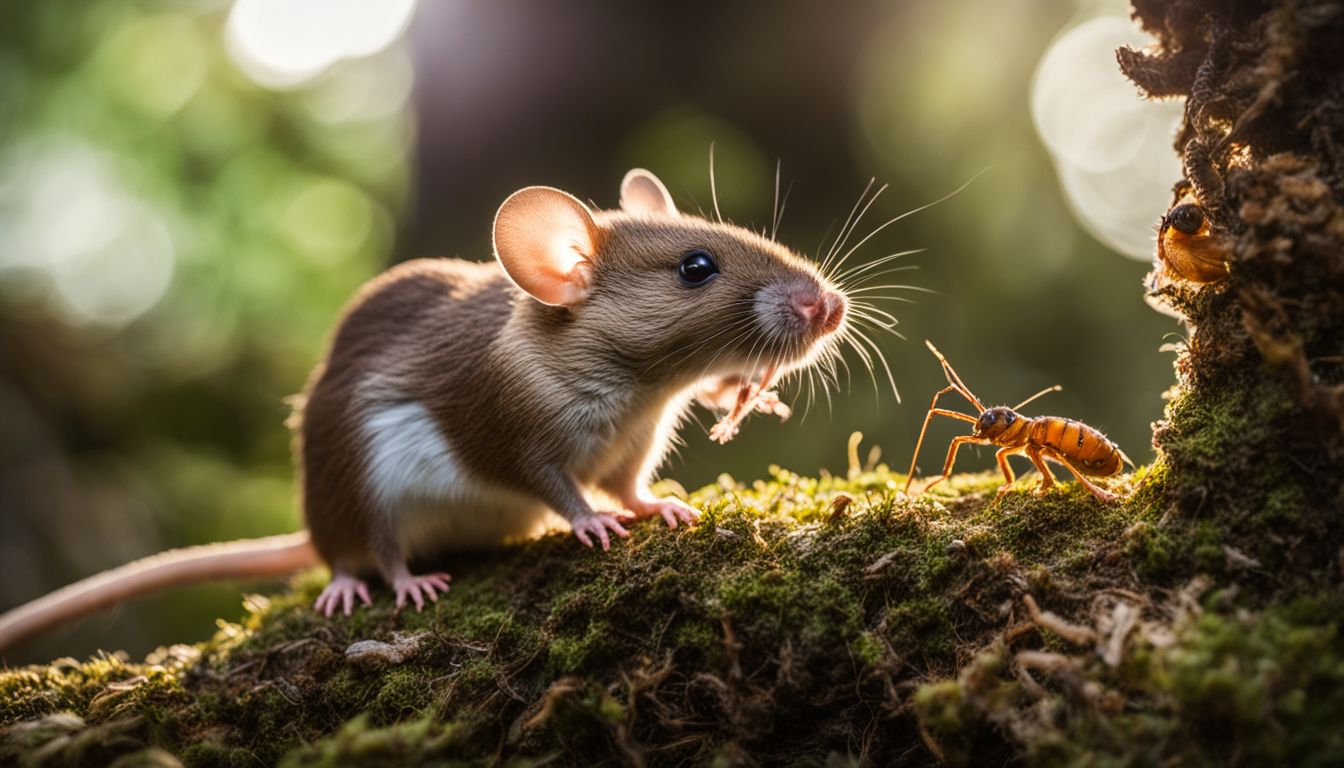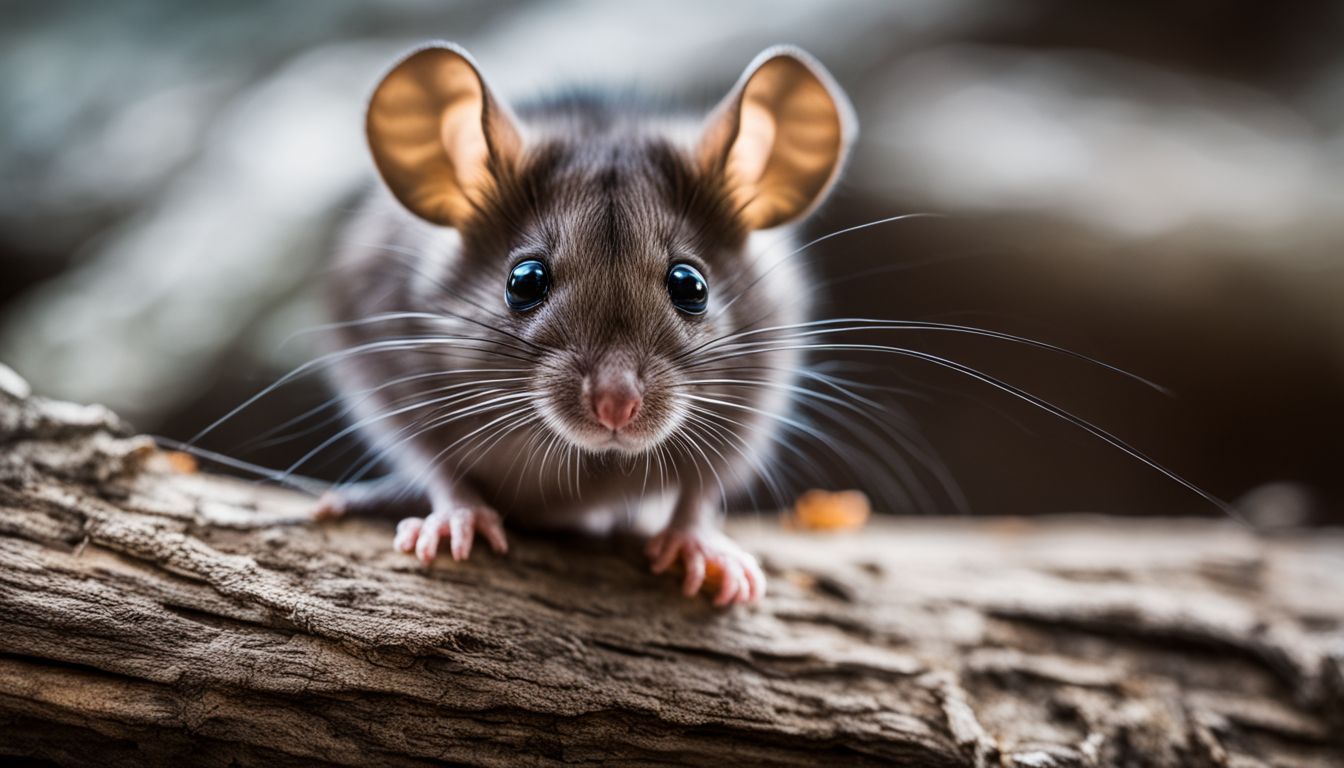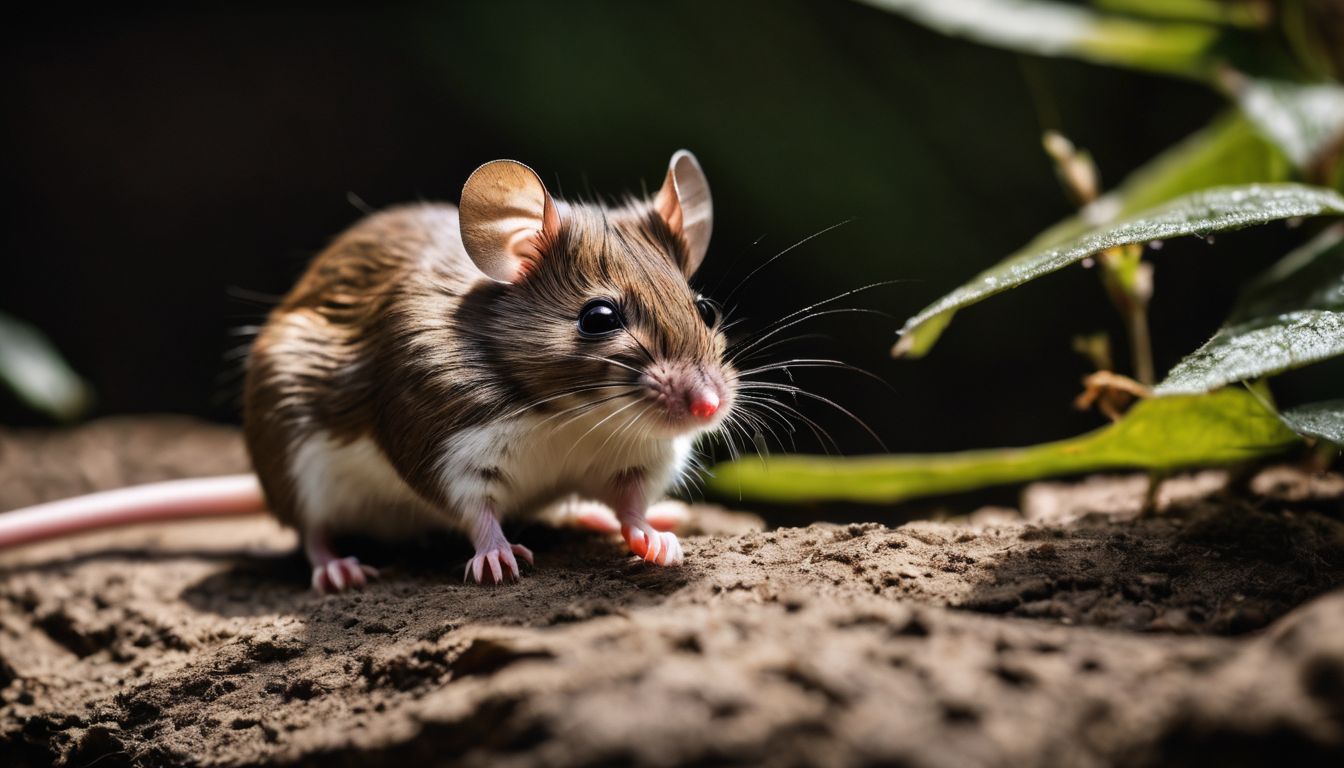Are you spotting more spiders in your home and wondering if the mice might be to blame? Mice are known for their diverse diet, which includes insects and sometimes spiders. Our blog post dives into the fascinating world of mouse diets to explore whether these little creatures help keep the spider population in check around your house.
Read on, and let’s uncover the truth together!
Key Takeaways
- Mice are omnivores and will eat spiders in certain situations, although spiders are not their primary food source.
- Spiders usually eat insects as their main food, while mice inadvertently help control household pests by preying on them.
- The presence of mice can significantly reduce the number of spiders and other ground – dwelling insects, impacting ecosystems, which highlights the delicate interplay between mice and spiders.
Understanding Mice as Omnivores

Mice have a diverse diet that includes insects, making them opportunistic feeders. This means they also consume spiders as part of their balanced diet.
The diverse diet of rodents
Rodents like mice eat lots of different foods. They love seeds, nuts, and grains the most. But they don’t just eat plants; they also munch on animal foods when they can. This means insects and even spiders might be a part of their menu.
They are smart animals that look for food everywhere. If there’s pokeweed or acorns around, you bet they’ll nibble on them. Their teeth help them get into all sorts of food packages too! So if you keep oats or peanut butter in your pantry without an airtight container, it could attract these little guys looking for a treat.
Next up is how much insects matter in what mice choose to eat.
Insects in the mouse menu
Mice like to eat more than just cheese. They munch on bugs too. Beetles, cockroaches, and spiders are all snacks for them. This is because mice are omnivores, meaning they eat both plants and meat.
With their sharp teeth, mice can bite into many kinds of insects.
These little creatures often find bugs in homes or outside where they live. Eating insects gives them protein which helps them grow strong and healthy. Next up: Do Mice Eat Spiders? Let’s find out if these eight-legged critters make it onto the mouse menu as well.
Do Mice Eat Spiders?

Mice may consume spiders in certain situations, but it is not their primary food source. Understanding the role of spiders in pest management and how mice inadvertently contribute to controlling household pests can provide insight into their interaction in the ecosystem.
Situations where mice may consume spiders
Mice are curious eaters and might munch on spiders if they come across them. Here are some reasons why a mouse might decide to eat a spider:
- If food is hard to find, a mouse may eat a spider as a last choice. This could happen in the wild or even in homes where pet food and cereals are kept safe in airtight containers.
- In their natural habitats, mice often look for protein – rich food sources. Spiders have good protein, so a hungry mouse might see them as a quick snack.
- Sometimes mice scavenge for whatever they can get. They may come across dead spiders and see an easy meal without needing to hunt.
- Young mouse pups could try eating spiders out of instinct. They explore and learn what’s good to eat by trying different things.
- During cold months when insects are less common, mice might turn to spiders as an alternative food option.
- Curiosity can lead mice to taste spiders they find caught in webs while foraging for other foods like bread or oatmeal.
Spiders as a non-primary food source
Spiders generally eat insects as their main food. They usually do not rely on mice or other vertebrates for their meals. While there are rare cases of spiders preying on small mice, it is not a significant part of the spider’s diet.
Their primary source of nutrition comes from insects like flies, mosquitoes, and ants.
The interaction between spiders and mice mostly revolves around the mouse consuming the spiders as part of its diet rather than the other way around. This makes spiders a non-primary food source for mice in most situations.
The Role of Spiders in Pest Management
Spiders play an essential role in pest management by preying on other insects, such as cockroaches and bedbugs. Their natural predatory behavior helps to control the population of household pests, making them an important part of the ecosystem.
Spiders as predators of other insects, such as cockroaches
Spiders are skilled predators that help control insect populations, including pesky cockroaches. They use their venom to paralyze or kill their prey, making them effective hunters in the ecosystem.
Spiders can catch and eat various insects like aphids, gnats, mites, and yes, even cockroaches. This natural pest control helps keep the population of harmful bugs in check without the need for harmful chemicals or poisons.
The Impact of Mice on Household Pests
Mice unintentionally help control household pests such as spiders by preying on them, which can impact the ecosystem of your home. Read more to understand the relationship between mice and spiders in pest management.
Mice as unintentional pest controllers
Mice play a surprising role as pest controllers in households. They feed on insects and other pests, unintentionally helping to keep homes free of unwanted critters. In the wild, mice have a varied diet that includes spiders and other insects.
Their big appetites lead them to eat numerous times throughout the day, making them effective at reducing pest populations without even realizing it. It’s important for homeowners to take action if there is a mice infestation and seek professional pest control services to ensure their home remains free from these unintended helpers.
The interplay between mice and spiders in the ecosystem
Mice, being omnivores, have a varied diet that includes spiders. However, the presence of mice in an area can significantly reduce the number of spiders and other ground-dwelling insects.
This decrease in spider population has consequences for ecosystems as spiders play an important role in controlling insect populations.
Spiders are crucial predators of insects across various ecosystems. The presence of mice can impact their populations, which disrupts the natural balance and may lead to an increase in certain pest insect populations within an ecosystem.
It’s important to understand this delicate interplay between mice and spiders to ensure the overall health and balance of our surroundings.
Keeping Your Home Safe from Mice and Spiders
Take preventative measures such as sealing cracks and holes, keeping food stored in airtight containers, and reducing clutter to discourage mice and spiders from entering your home.
To learn more about the interplay between these pests and how to keep them at bay, read on!
Preventative measures for homeowners
To prevent mice and spiders from entering your home, follow these steps:
- Store food in airtight containers and dispose of garbage regularly to remove potential food sources for mice and spiders. This reduces the likelihood of attracting them to your home.
- Keep attics, basements, and crawl spaces well ventilated and dry to deter mice and spiders from nesting in these areas. These areas are attractive to pests when they offer suitable living conditions.
- Conduct regular home maintenance, inspections, and keep clean habits to reduce the risk of a rodent infestation.
- Use repellents and preventative measures during the summer months to help keep mice out of your cabin or home during winter.
- Employ effective mouse control through sanitation, mouse-proof construction, and population reduction as preventive measures against infestations.
- Remove sources of food, water, and shelter to discourage rodents from making themselves at home in your living space.
- Seal any openings or cracks in walls, floors, or foundations using expanding foam or other appropriate materials to prevent unwanted insects, spiders, and cold air from entering your home.
Professional pest control options
To complement preventative measures for homeowners, professional pest control options provide effective solutions to keep your home safe from mice and spiders. Here are some of the methods used by pest control professionals:
- Inspection and Assessment: Pest control experts conduct thorough inspections to identify mouse and spider infestations in your home, determining the extent of the problem.
- Treatment Plans: Based on their assessment, professionals develop customized treatment plans that may include baiting for mice, trapping, and targeted insecticide application for spiders.
- Monitoring and Follow-Up: Pest control professionals monitor the effectiveness of their treatment plans over time and provide follow-up services to ensure long-term elimination of pests.
- Integrated Pest Management (IPM): Some professionals use IPM strategies that focus on long-term prevention through a combination of techniques such as habitat modification and exclusion methods.
- Safe Disposal: When using pesticides or traps, pest control experts ensure safe handling and disposal according to environmental regulations to prevent harm to humans or non-targeted wildlife.
- Education and Prevention Tips: Professionals also offer advice on preventing future infestations through practices like proper food storage, sealing entry points, and eliminating clutter where pests can hide.
Conclusion
In the end, it’s clear that mice are omnivores and will eat spiders in certain situations. Spiders might not be their main food source, but they can still end up on the mouse menu.
Understanding this dynamic helps us appreciate the intricate balance of nature within our homes and surrounding ecosystems. So, while mice may snack on spiders from time to time, they have a varied diet and play an essential role in the circle of life.
If you’re interested in learning more about how spiders can help control cockroach populations, be sure to check out our detailed article on the subject here.
FAQs
1. Do house mice eat spiders?
Yes, house mice might eat spiders like common house spiders or cellar spiders if they catch them.
2. Are all types of mice known to eat spiders?
Not all, but some like deer mice may snack on bugs including brown recluses, jumping spiders, and sometimes even black widows.
3. What do mice usually like to eat?
Mice usually prefer grains like wheat, seeds such as peanuts and sunflower seeds, fruits including dried apricots and berries, vegetables like carrots; but they’re opportunistic and will nibble on lots of different things.
4. Will I find a mouse eating a tarantula?
It’s rare for a mouse to attack something as big as a tarantula because it’s risky; however if really hungry or the spider is easy prey maybe it could happen.
5. Can getting rid of spiders help with mouse problems in my home?
Since mice can find other food easily like crumbs or food products in your pantry just removing spiders won’t keep the mice away by itself – you need good rodent control too!
6. Do exterminators consider that mice might be eating the insects when controlling pests?
Exterminators know that rodents may also be after insects so wildlife control pros use this knowledge to plan how best to manage both critters in your home.




